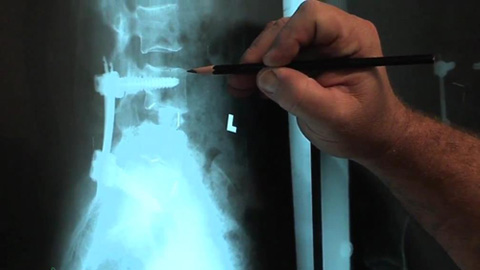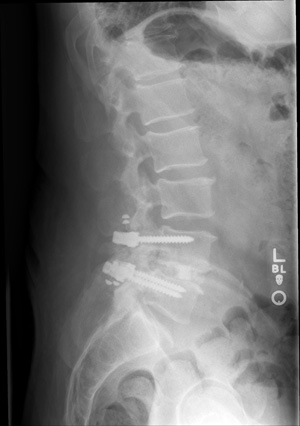Archive for the 'Benefits of Quitting' Category
BACK SURGERY: QUIT SMOKING FOR A SAFER AND SPEEDIER RECOVERY
(Skip – this one’s for you. Below the text there’s also a video link:)
My good friend was suffering with intense back pain for many years. He had been putting off much-needed corrective surgery (to include a spinal fusion) until he could stand the pain no longer. Then, just a few short days before his scheduled surgery was finally to take place, he received a call from his surgeon. The doctor had just been informed by the insurance company that they would not pay for the surgery after all. The reason? Because my friend had not quit smoking.
Spinal Fusion and Cigarette Smoking
Spinal Fusion is a surgical procedure used to join together bony segments of the spine (eg, vertebrae). In order for fusion to heal, new bone growth must occur, bridging between the spinal segments. Sometimes fusion is combined with another surgical technique termed spinal instrumentation. Instrumentation consists of different types of medically designed hardware such as rods, hooks, wires, and screws that are attached to the spine. These devices provide immediate stability and hold the spine in proper position while the fusion heals. Spinal fusion (also termed arthrodesis) can be performed at the cervical, thoracic, or lumbar levels of the spine, taking months to heal.
The long-term success of many types of spinal surgery is dependent upon successful spinal fusion. In fact, if the fusion does not heal, spinal surgery may have to be repeated. A failed fusion is termed a nonunion or pseudoarthrosis. Spinal instrumentation, although very strong, may even break if nonunion occurs. Needless to say, spine surgeons try to minimize the risk of this happening by prescribing a bone growth simulator.
Cigarette Smoking and Failed Fusion
Certain factors have been found to affect the success of spinal fusion. Some of these factors include the patient’s age, underlying medical conditions (eg, diabetes, osteoporosis), and cigarette smoking. There is growing evidence that cigarette smoking adversely affects fusion. Smoking disrupts the normal function of basic body systems that contribute to bone formation and growth. As mentioned previously, new bone growth is necessary for a fusion to heal.
Research has demonstrated that habitual cigarette smoking leads to the breakdown of the spine to such a degree that fusion is often less successful when compared to similar procedures performed on non-smokers.
Postoperative Infection
Cigarette smoking compromises the immune system and the body’s other defense mechanisms, which can increase the patient’s susceptibility to post-operative infection.
Conclusion
Clearly, cigarette smoking is detrimental to spinal fusion. People who are facing fusion or any spine surgery should make every effort to stop smoking. Quitting the habit beforehand will decrease the associated risks and increase the likelihood of a successful spinal fusion surgery.
To watch a video regarding the effects of smoking on spinal and other surgeries, click the image below:

Everyone knows that smoking can lead to a number of serious health issues, including hardening of the arteries, heart attack, stroke, COPD, gum disease, diabetes, and a variety of cancers throughout the body (just to name a few.) What some may not be aware of, however, is that quitting smoking can greatly reduce the risk of most, if not all of those illnesses and diseases.
Click the image below to see an illustration that demonstrates how quitting smoking can improve your health over time. It’s never too late!

This past February 24th I was admitted to the Loma Linda VA Medical Center for a scheduled lumbar laminectomy and spinal fusion surgery. Having listened to pain-filled horror stories from several friends and relatives who had undergone similar procedures, I was definitely not looking forward to this. To say I was feeling anxious over it all would be an understatement.
It has now been more than two weeks since the surgery. I came home from the hospital on February 28th. Has it been a painful experience? Yes it has, but not nearly as bad as I was anticipating. In fact, I was up walking around the very next day after my surgery and I’ve been walking every day since. I still have some pain, but each day it dissipates a little bit more. Overall, it has been completely manageable.
So, what does this have to do with smoking? Perhaps more stressful than the actual surgery itself was the stay in the hospital. There I was lying in a strange bed in a strange room with a strange roommate. Throughout the day and night, nurses and doctors would come by to poke, prod, and otherwise monitor our progress. Mind you, I understand that this was all done for our own good but apparently a hospital is the last place on earth we should turn to for a good night’s rest. Thinking back on the experience, what would I have done if I were still a smoker? Talk about stress!
There are no hospitals I’m aware of that allow smoking within their walls anymore. I can’t imagine what it would have been like as a smoker to be confined to such a stressful environment for so many days without having a cigarette. Knowing how badly I was addicted before I quit, I might have even postponed or cancelled my surgery rather than be forced to endure it all without a cigarette for such a length of time. It makes me wonder – how many others have turned down surgical or other needed procedures simply because they’re not allowed to smoke inside a hospital or other medical facility?









